Chamber Promotes Diversity, Education and Economics
Cary, NC — The Town of Cary is at a pivotal point in its history this year. Operations went virtual overnight in March 2020, revenue losses were felt in the millions and social outcries were echoed through the streets in a fight against racism.
The 2020 Virtual Cary Chamber Planning Conference kicked off with messages on these topics and how the Town plans to move forward.
The Mayor’s Report
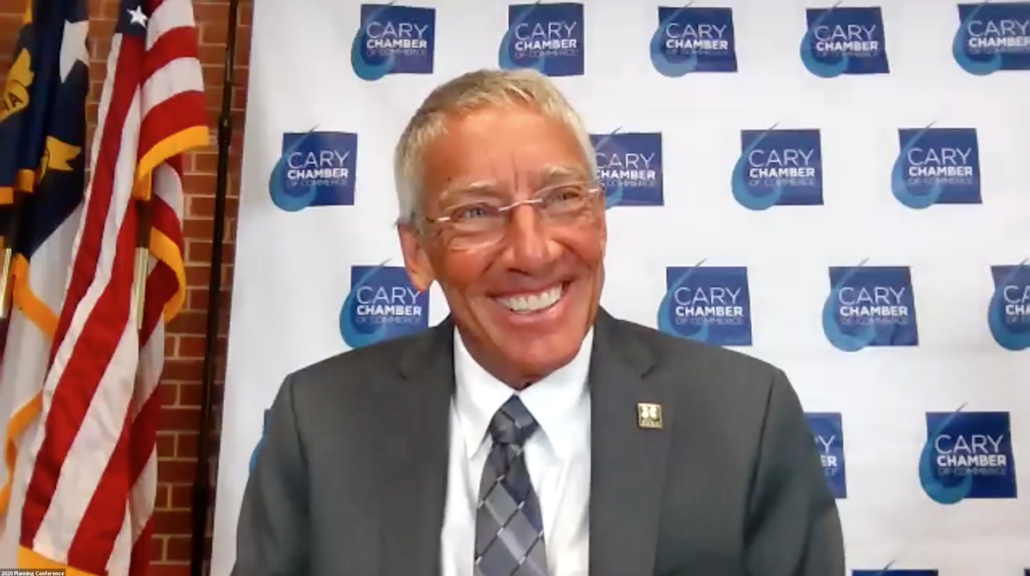
Cary Mayor Harold Weinbrecht gave an overview that largely mirrored his State of Cary Address, highlighting upcoming and in-the-works developments coming to Cary. One project of note is the progress of the Downtown Park which now has a comprehensive design that will likely see a few minor tweaks. Construction will begin in 2021 with completion by summer 2023.
COVID-19 in Cary
On the topic of COVID-19, Weinbrecht reported that Cary is “leading the county” in how its citizens and leaders are following the guidelines. The numbers are reflecting this statement with 5.8 infections per 1,000 people in Cary, a near tie for the lowest rate of infection in all of Wake County’s municipalities.
“Personally, I feel that we are about half-way done if we’re lucky. So, we’re going to need to bare down, continue to practice the 3 W’s for at least several more months as we wait on the vaccine and as we wait to get to yet another new normal,” said Weinbrecht.
Racial Relations
Following the national outcries for change that came with the death of George Floyd, Weinbrecht signed the Obama Foundation’s Mayor’s Pledge on June 3, 2020. His signature indicates a commitment to action on these issues. So far, the Town has started up an internal review of practices and policies on things like use of force with the help of an outside consultant.
In spring or summer 2021, a Diversity and Inclusion Taskforce will form, seek public input and a report will come together by end of 2021. From this report, revisions and policy changes will be made wherever found necessary.
Cary’s Financial Footing
On the topic of finances, Weinbrecht was candid in saying the Town is suffering like many individuals and businesses are. Right now, expenditures since the start of the pandemic exceed $4.3 million. Roughly $3.2 million was lost in Parks & Rec revenue alone with an additional $2.5 million lost in sales tax revenues.
Cary received $750,000 from Wake County out of the $194 million they received from the Federal CARES Act for COVID-19. Chatham County also pitched in, giving Cary $126,000.
“That is still not scratching the surface of what we’ve suffered here in Cary and Cary is one of the lucky ones,” said Weinbrecht. “It’s going to be a tough road and we have to budget and plan accordingly and I believe our staff is doing exactly that.”
Town May Remain Closed Through February 2021
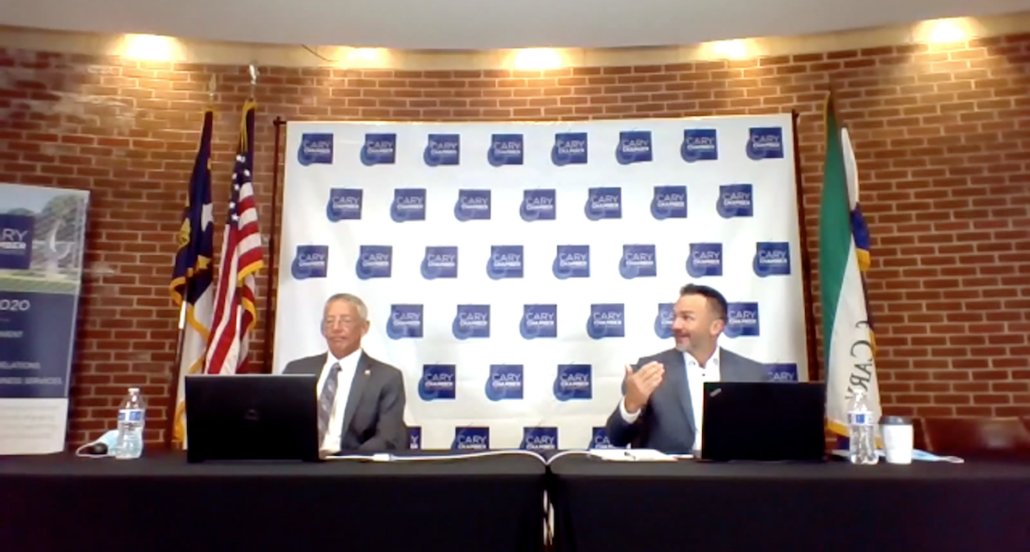
Cary Mayor Harold Weinbrecht, left, and Town Manager Sean Stegall present at the 2020 Cary Chamber Planning Conference.
In his comments, Town Manager Sean Stegall addressed strategies behind Town operations and what moving forward looks like.
While a vast majority of Town programs and departments have been revamped or recreated to have online offerings, 80% of its workforce is working in the field or in the office in some fashion. Of the 1,200 employees of the town, 6 have had a positive case of COVID-19.
Stegall said, “We are no longer treating the pandemic as something that is temporary, but as something that is long term. And then when it does end and thing go back to ‘normal,’ whatever that will be, we will be better prepared for that.”
Chamber Board Chairman Steve Zaytoun asked Stegall when Town Hall would reopen its doors.
“I think we’re going to keep our town facilities closed for a long time. At this point I’m thinking probably, at the least, until the end of February because there isn’t a data set that would indicate that we would be able to safely say to our employees, ‘Look, it makes sense and it’s a good business decision for you to come back,'” said Stegall.
Looking to the positive, he says Cary has the luxury of using this time of extension to push forward in virtual and adaptive ways while pushing people out of a temporary mindset and keeping more people safe.
Education Report from the NC House
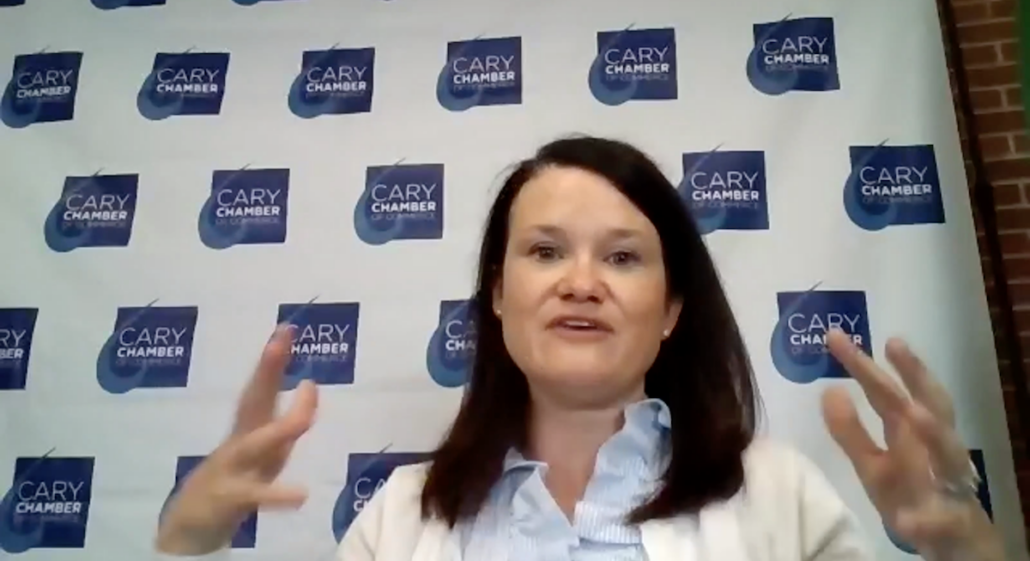
District 57 Rep. Ashton Wheeler Clemmons of the NC House of Representatives joined the conference to speak on the education in the state. Primarily, she covered the challenges and opportunities being recognized at the General Assembly.
Current Challenges
Due to the ever-changing nature of getting students “back to school,” Clemmons said there was no great answer for what to do and how to do it. Because of this, NC is seeing a wide variety of approaches including in-person classes, virtual instruction and staggering schedules.
Issues arise namely in the areas of technology, connectivity, nutrition, transportation and providing PPE for staff and students. A strain is being put on families who do not have access to reliable internet and devices. Further, many parents working from home will be juggling their own meetings and calls in addition to the live, online instruction of their kids.
In the area of nutrition, Clemmons said, “We have hundreds of thousands of kids in North Carolina who get their breakfast and lunch, and sometimes dinners, when they’re in school. Our school districts have done an excellent job filling up buses and delivering food, but that is not a financially sustainable model.”
Future Opportunities
To look at the silver lining of the situation at hand is to look into the future and how traditional education may change.
“This will be a time where we ought to be learning how we can know where kids are and move them quickly to get them where they need to be once we are able to be back in the buildings,” said Clemmons. On the downside, this unpredictable time period will result in some falling behind, but on the plus side, Clemmons says it may be creating an education system with more flexibility.
“If we are thinking creatively, this can provide opportunities for kids to travel while they’re in school or work or do apprenticeships. There’s a lot of great work that can happen if we’re willing to think more flexibly about when kids have to be in school and not measuring it by they have to be in the building from 8-4 o’clock,” said Clemmons.
Moving forward, the legislature is looking to pivot from day-to-day crisis management to finding solutions for future school years and looking at how to overcome the new challenges.
Defining Diversity, Applying Inclusion in the Workplace
Tru Pettigrew, a Diversity and Inclusion Expert, spoke on the timely subject of creating more inclusive workspaces. He introduced the three different variations of diversity—identity, experiential and cognitive and broke down how they can enrich a team.
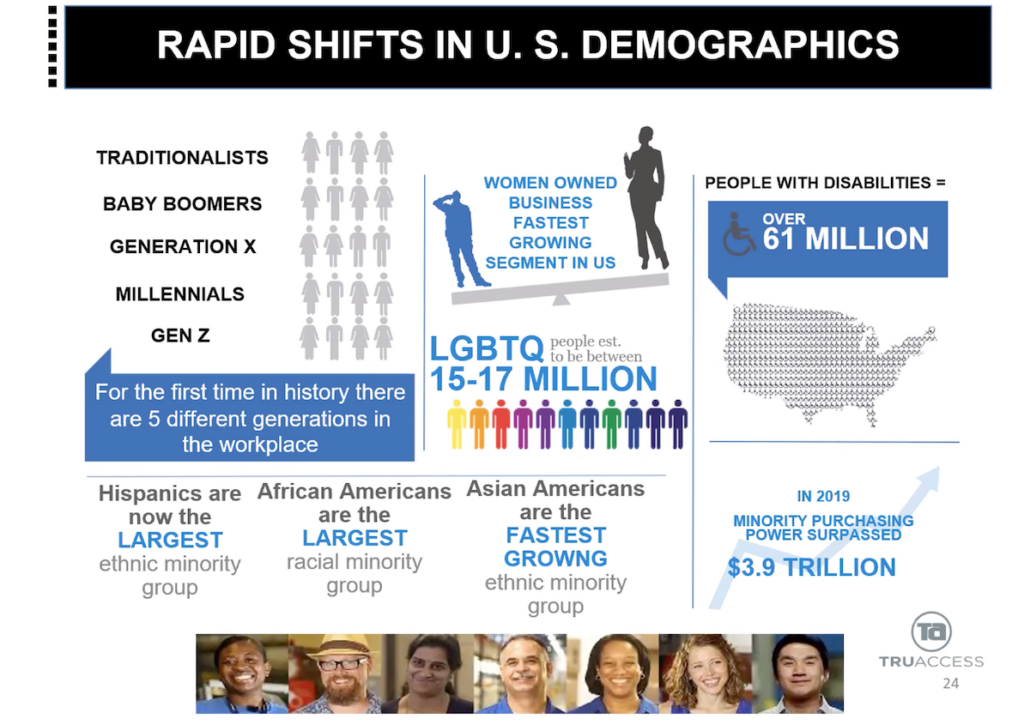
“There’s tremendous amounts of diversity and if you are going to thrive in the society and the world that we live in, we need to understand how to embrace the diversity that is available to us. It’s a necessary skill to understand how to embrace diversity, but it doesn’t stop there. We also have to be willing to go beyond diversity so we can experience the power that comes with inclusion,” said Pettigrew.
His speech also included topics of implicit bias and the importance of meeting people where they are. See more from Pettigrew and former police chief Tony Godwin in their open conversation on race and policing in Cary.
The Economic Reset with Ted Abernathy
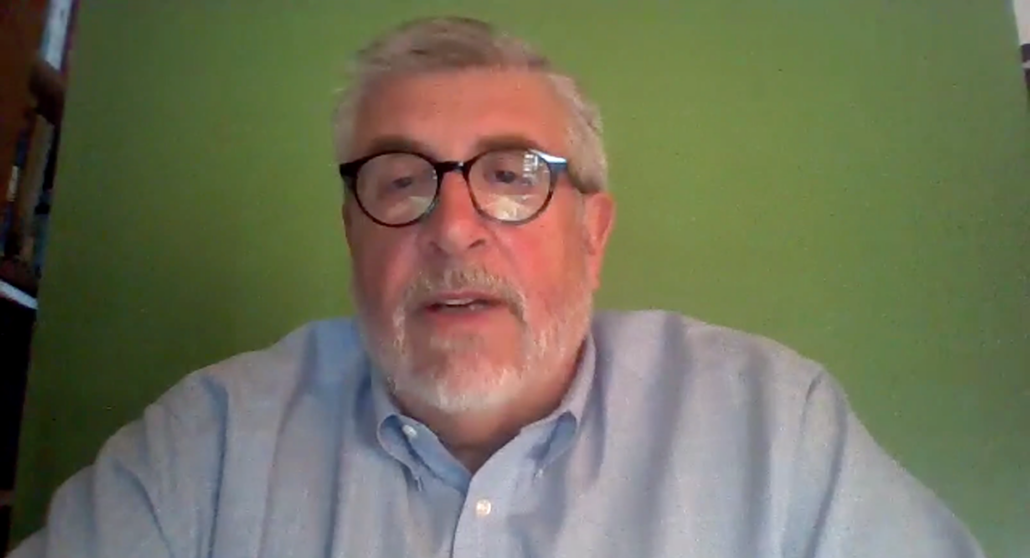
According to economist, Ted Abernathy, the pandemic has had very uneven economic impacts across the board. This applies most directly to the impacts felt from state to state and sector to sector.
North Carolina is faring better than the national average of job loss with 7.4% loss in NC compared to the 8.7% U.S. average from June 2019- June 2020. As for sectors, the heaviest hit is the leisure & hospitality industry. When comparing its employment numbers a year ago, this sector has lost just over a quarter of its workforce.
Good news for the Cary/Raleigh area is that the area is in the top 5 for metropolitan areas expected to bounce back the quickest across the country.
The New/Next “Normal”
As far as when the economy will be thriving again, Abernathy says there’s a long road ahead before we get back to anything resembling a previous normal.
“We’re reinventing the normal as we go,” said Abernathy. To break down what the next normal in economics looks like, he says it boils down to these 10 things starting with R.
1. Remote Everything
Telemedicine, shopping, entertainment, banking are here to stay.
2. Relocation Reconsideration
A recent survey from FinanceBuzz found that a quarter of Americans are considering a move because of COVID-19.
3. Robot Re-emphasis
Robotics have been around a long time in the manufacturing and construction industries, but newcomers to the game are expected to be retail and service industries. A big reason Abernathy says for this is, “robots don’t get sick and aren’t subject to stay-at-home orders.”
4. Reserve Workforce
A future with more gig-based, temporary and part-time employment is expected as businesses cannot predict what their workforce needs will be.
5. Rising Geo-Muddle
On a global scale, Abernathy says there are many foreign countries and events to keep an eye on that will come to effect the US economy including Hong Kong’s status as an international city, Brexit and other happenings in Turkey, North Korea and the European Union.
6. Reshoring and Redundant Supply Chains
Many supply chains are predicted to get shorter and more redundant. With that comes some unique opportunities for new supply chains to emerge like in biopharma industry which the Triangle is filled with.
7. Real Estate Reuse
Just as we are seeing in Cary, there’s going to be a rise of closures of big box stores and a rise of mixed use.
8. Reflection
Nationally, there is a lot of reflection going on with topics of race and injustice. As Abernathy put it, this reflection will play out at the ballot boxes and he believes the pandemic only amplifies these issues.
9. Risk
Businesses will have to question whether they can move forward at a similar pace to years past and will weigh decisions against the tumultuous political and social climate.
10. Repositioning for Competitiveness
In terms of economic development in NC and in the Cary regions, Abernathy says, “Where we were before won’t be exactly where we are afterwards.” He thinks it will be better because of the technology, biopharma, and quality of life found here.
Patience, Patience, Patience
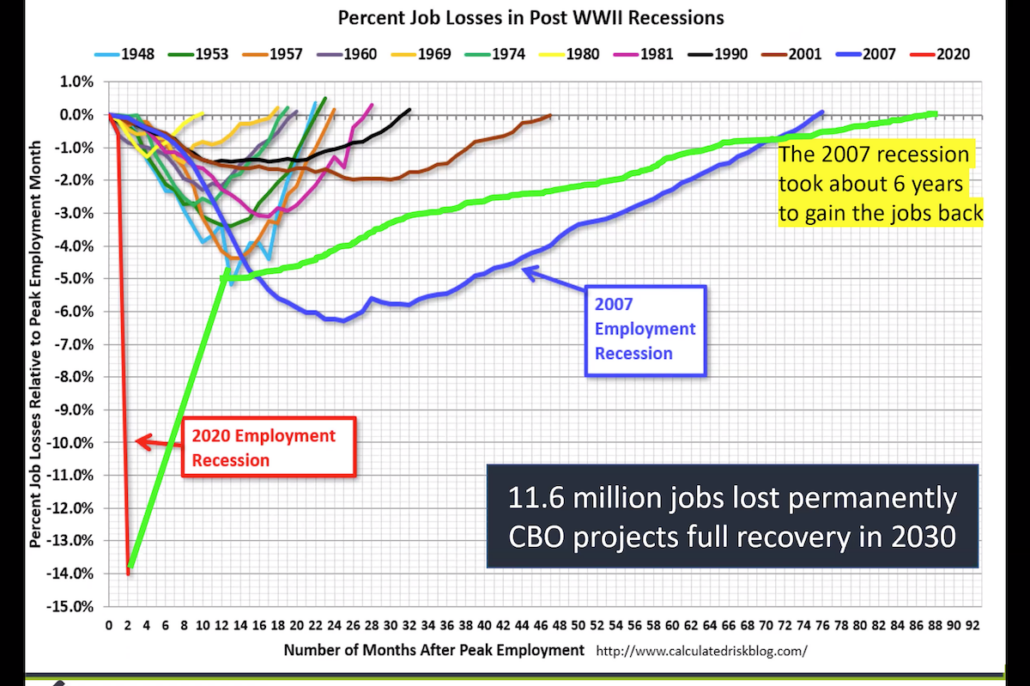
The lime green line indicates the prediction of Abernathy’s firm, many jobs will come back fairly quickly followed by a long drudge to get back to the job level that was seen pre-COVID.
It took the country six years to bounce back from the unemployment spike in the 2007 recession. The Congressional Budget Office is currently predicting a 10 year return following the pandemic.
Story by Ashley Kairis. Images screen captured from the live conference.
All the Cary news every day since 2009. Subscribe by email.

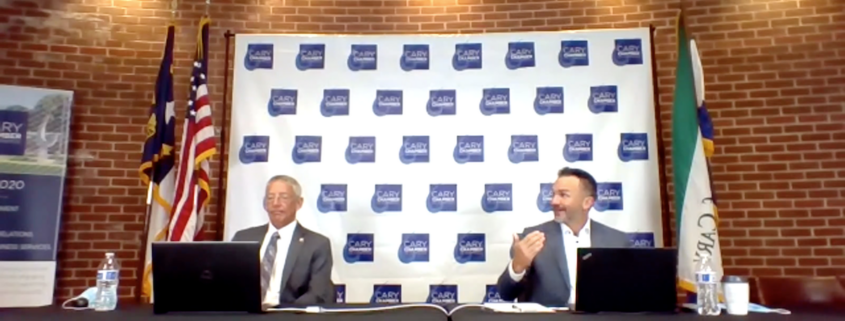


I volunteered to help the diversity task force as it was being created. I feel bad that I was never contacted and felt I had a lot to offer!
Hang in there- you never know if you may be picked for something else in the future. The town’s task forces have a limited number of people selected and they always try to pick a diverse crew. Don’t be discouraged. I would also suggest to you, that get involved with the Cary 101 class (used to be called Cary School of Government). Its a great way to learn about town government and quite often graduates are picked for other boards and commissions when they apply because it shows commitment to the town.
The article states: “In spring or summer 2021, a Diversity and Inclusion Taskforce will form, seek public input and a report will come together by end of 2021. From this report, revisions and policy changes will be made wherever found necessary.”
It seems to me the delay is grossly overlong and unworthy of the Town of Cary. If there is an adult or child, or adults or children, suffering or injured or excluded because of minority status, that that should be considered an emergency of the first order, and should be addressed with the same alacrity Mr. Hecht’s forces prepare for a snowstorm, Chief Dezomits’s officers respond to a civil emergency, and Chief Cooper’s firefighters respond to a blaze.
I recall that the Stormwater Working Group took nine months to prepare a report and it took a few more months for that report to get put to Council. The only actual action the Group recommended was to clean storm drains when they get clogged. It seems to me this action should have been discussed in the first hour of the first meeting, and that it should have been recommended immediately rather than waiting an additional 11 months for that wisdom to be shared.
My point here is that deadlines set, especially ones that will span more than a year, have the unintended effect of postponing necessary action.